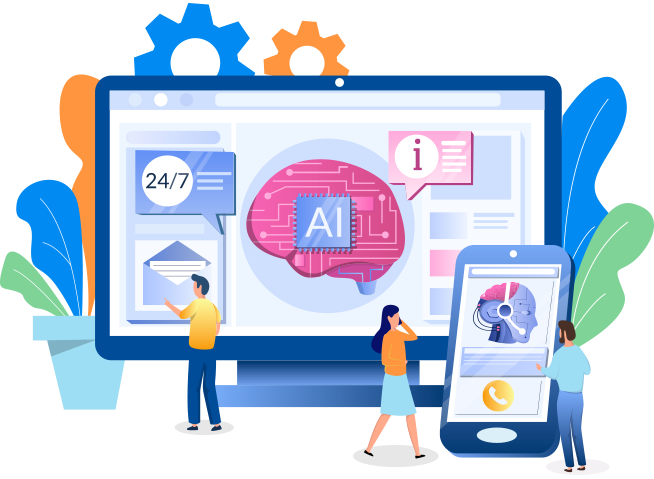
AI-driven knowledge management to deliver better self-service customer experiences and increase operational efficiency. Empower your customers with the most relevant content for self-service success and faster, more accurate agent-assisted answers without the need for transfers and call-backs.

Give customers the freedom to help themselves.
From search engines to web pages and virtual agent bots – ensure your customers can find the answers they are looking for with an effective knowledge management system.
Make the right self-service answers easy to find with smart knowledge management.
Optimise your organisation’s content to improve the customer journey with effortless self-service, starting at internet search and extending across web pages, bots, and digital channels.
Global knowledge provides one source of truth for agents and customers across all of your sites, brands, locales, languages and more.
A customer service knowledge base is an organised collection of documentation that users can access through basic browse and search functions. It typically includes answers to frequently asked questions (FAQs), how-to-guides, and troubleshooting functions. A good knowledge base will help customers to self-serve and find answers to solve problems on their own. When it is done correctly, a good customer service knowledge base will enable you to scale your customer support program whilst reducing customer effort and improving your overall customer experience (CX).
A knowledge base is a great solution for any sized organisation due to its low investment costs. However, because basic knowledge bases are limited in capabilities needed for easy content management, a robust knowledge management solution has a far greater impact on customer and employee experience.

Knowledge Management is the process of creating, centralizing and sharing organisational knowledge. Within Customer Service, Knowledge Management refers to an accessible, consolidated framework of all information customers may need throughout their customer journey. Typically accessible on any channel, a stockpile of knowledge content is available to provide easy answers to solve customer queries.
In your contact centre, helping your customer find answers quickly and easily is paramount.
When managed properly, a knowledge base can surface fast answers to your customers’ needs. When knowledge is made available within the product, chatbot, website, mobile app, customer relationship management (CRM) tools, and even on unowned properties like Google, it can deeply impact the customer effort – and in turn, their experience.
Knowledge Management helps organisations to support the customer journey at every touchpoint, from research and purchase to support and advocacy.
By providing quicker help to customers within their preferred channels, you can deliver better customer experiences and gain a competitive edge. Customers are seeking instant and personalised user experiences throughout their journeys, so making it easy for them to locate relevant content, retrieve information, and answer questions is essential for great CX.
When your customers need information, they’ll most likely turn to Google first. When your website article easily answers their question, or it appears as the top search result and they can easily resolve their issue without additional help, that’s knowledge at work. When your customers arrive at the next step (whether that’s a product page, troubleshooting guide or other), your knowledge content signposts them in the right direction. Whether customers access documentation and help via your website, or they engage with a chatbot once they’re on your site, offering Knowledge Management solutions for digital self-service will satisfy their needs.
Effective Knowledge Management improves the customer experience by reducing time to answer and improving the quality of help.

Find out how Ogi transformed its contact centre operations with a unified cloud platform – delivering more personalised service, faster responses, and reliable communication.
Read More
Discover how the Theo Paphitis Retail Group implemented a unified, cloud-based contact centre solution in just six weeks – ready in time for the Christmas trading season.
Read More
Learn how Centrepoint implemented a flexible, multi-channel contact centre solution to improve service for vulnerable young people.
Read More
Discover how South Western Railway replaced legacy systems and introduced self-service to simplify operations and improve satisfaction.
Read More
Learn how Carnival UK modernised guest communications and advanced its AI roadmap with a future-ready contact centre platform.
Read More
Discover how The Revel Collective transformed customer communication across 60 venues with a scalable, insight-driven telephony solution.
Read More
Route 101 and Wales & West Utilities partner to manage deployment across 46 sites and transition 635 users
Read More
Fulcrum Automotive improves routing, reduces handle times, and unifies interactions with an all-in-one solution delivered by Route 101.
Read More
Cooplands partners with Route 101 to refine its Zendesk platform, implement a Zendesk Messaging chat service, and improve self-service features.
Read More
Route 101 supports BoyleSports in improving customer satisfaction, expanding self-service capabilities, and streamlining support operations.
Read More
Route 101 helps Riverford unify contact centre technology with a streamlined solution that integrates systems, payment options, and a customer-first approach.
Read More
Blackcircles improves automation, optimises workforce management, and introduces robust reporting to its contact centre with Route 101’s help.
Read More
All About Food elevates customer interactions with Route 101’s help and Zendesk Suite Professional across all channels.
Read More
Route 101 helps Hancocks, the UK’s biggest supplier of wholesale sweets, slash response times from hours to minutes, and boost customer satisfaction.
Read More
Route 101 supports ACC Liverpool in implementing Zendesk to allow its team connect more effectively with customers and serve across multiple channels.
Read More
Learn how Virgin Red revamped the existing Zendesk platform to fully optimise its help centre and provide customers with self-serve capabilities.
Read More
Route 101 empowers Mitsubishi Motors UK to optimise its Zendesk instance and equips its team with expertise to manage and grow the platform.
Read More
Dojo transforms its contact centre platforms and upgrades its WFM processes to deliver exceptional CX and drive growth with Route 101's assistance.
Read More
Route 101 implements Zendesk Suite Enterprise for efficient and automated management of customer service enquiries at PINS.
Read More
Beauty Pie work with Route 101 and Digital Genius to automate its operations.
Read More
Teleperformance UK Group worked with Route 101 to implement NICE CXone - enabling the business to scale at speed and meet unprecedented levels of inbound demand.
Read More
Brandon Hire Station boost sales and CSAT with Route 101 and partners.
Read More
Belmond prioritises intelligent interaction routing and increased data insights with NICE CXone – implemented by Route 101.
Read More
See how moving to the cloud meant Teign Housing's advisors could get a handle on multiple interaction channels.
Read MoreInformed agents elevate your business. In order for agents to enjoy high levels of satisfaction, as well as become more efficient and effective, they need the right knowledge, tools, and resources to support them.
A smart knowledge base can help agents in three key ways:


A good knowledge base of content can aid agents with the information they need to better serve customers, whilst effective Knowledge Management makes it easy for support teams to share knowledge and to learn more about products and services.
Knowledge Management creates a better working experience for agents in numerous ways, including delivering agent assistance, to ensure agents have the right information on hand. Organisations with strong Knowledge Management tools can enable subject matter experts to contribute knowledge content and formalize the process of sharing expertise.
By creating internal document repositories, businesses can house helpful knowledge like HR documentation and compliance materials and ensure that this is accessible across the organisation.
Using a smart knowledge base can unlock agent potential - make it easier for agents to effectively serve customers by extending important content into their workspace. Knowledge Management can also have a big impact on training and onboarding by making the right knowledge readily available to agents.
By using bots to resolve basic, common queries, organisations can free up agents to support the more complex interactions, whilst reducing agent frustration and increasing agent engagement.
Incorporating AI-powered Knowledge Management into bots to enable them to intelligently match customer questions to related content already available within your knowledge base, and offer that answer to the customer, will free up your agents to focus on the tougher questions that require a more human touch.
When it comes to Knowledge Management, relevance is key, and the right Knowledge Management solution will get relevant information to your agents faster. Leveraging machine learning and AI to find and display the best article recommendations from the knowledge base will improve agent efficiency, and, as a result, boost both customer and agent satisfaction.
AI can also be used to identify gaps in content where you need new content or where existing material can be improved based on the issues that customers are having.
Agents can often take an active role in ensuring the health of your knowledge base, by:
Providing feedback on existing or potential articles within the help centre
Vetting articles on a regular basis to ensure their relevance
Publishing directly to the help centre

Knowledge Management can directly impact your business KPIs and boost long-term customer loyalty and a willingness to recommend your brand to others, by reducing the time to answer and improving the quality of help. Knowledge Management is directly tied to the following metrics:
Net Promoter Score (NPS) measures the extent to which a customer is prepared to recommend a business to others. Successful Knowledge Management supports and supplies customers with comprehensive product information and documentation to foster brand advocacy.
Customer Effort Score (CES) measures how easy it was for customers to find what they were looking for, or to resolve an issue. This includes finding self-service content in all digital channels they use and contacting support with ease.
Customer Satisfaction (CSAT) measures the support experience after cases are closed and satisfaction with the service provided. Effective Knowledge Management keeps customers from needing to repeat themselves by presenting a history of content viewed, and empowers agents to find the documentation they need to reach a resolution quickly.
To measure the success and efficacy of a knowledge management platform, organizations must look at key customer (internal and external!) outcomes, as well as broader organizational KPIs.
Prioritising customer experience is one thing, but delivering timely content in the various channels that comprise the customer experience is another challenge altogether. The scope and reach of Knowledge Management has expanded significantly to accommodate evolving contexts, devices and channels that internal (support agents / employees) and external (customers) audiences use to seek information.
When done right, a Knowledge Management system can empower customer self-service and minimise inbound contact, promoting customer success and reducing cost to serve.
If you would like to know more about our knowledge management solutions or you just have some additional questions about our partners, products or services, please click to book a discovery call today. For general questions or customer support please visit our Contact Us page.



GET IN TOUCH:
Bristol (HQ): Route 101 Ltd., The Conifers, Filton Rd, Hambrook, Bristol, BS16 1QG

All Rights Reserved / Route 101 Ltd. / Company Registration Number 08325675